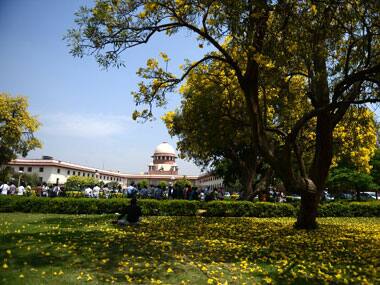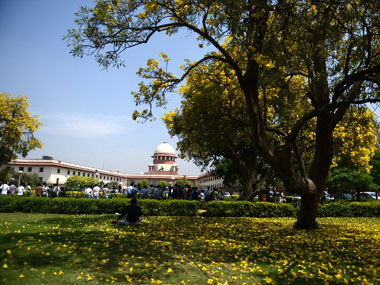Judges will continue to appoint judges. The Supreme Court has invalidated the 99th Constitutional Amendment and National Judicial Appointments Commission (NJAC) Act “unanimously” passed by both Houses of Parliament — barring Ram Jethlamani who abstained from voting — and ratified by 20 states. The passage of the NJAC bill and consequent constitutional amendment in August last year was termed as the single biggest effort at judicial reform in independent India. Though the idea of NJAC was mooted during the Atal Bihari Vajpayee government and a bill to this effect was introduced by the UPA I after rounds of scrutiny by parliamentary committees, it got a massive push from the Narendra Modi government. This ensured the passage of the bill in the first full-fledged session since Modi took office. [caption id=“attachment_2471308” align=“alignleft” width=“380”] File image of the Supreme Court of India[/caption] Communication and IT Minister Ravi Shankar Prasad who as the then Law Minister had piloted the bill in both Houses of Parliament strongly defended the 99th constitutional amendment saying “this was a unique occasion on the political horizon of India when both Houses of Parliament unanimously passed the bill barring one member walking out and 20 states ratifying it.” He reacted to the verdict in the routine way, saying the government “welcomes the judgment and has full faith in the judiciary and respects its independence” but made his criticism of the verdict known. “The fact that the Supreme Court has said that it will do away with the shortcomings of the collegium system and make it more transparent is an admission that the system had shortcomings and it needed a correction”, the minister said. Though he said that the government would take a position — whether to seek a review by a larger bench or refer it to Parliament — after a detailed reading of the verdict, he clearly expressed government’s unhappiness over the matter. Law Minister Sadanand Gowda expressed surprise at the SC verdict. Prasad named several former judges and chief justices of Supreme Court who had expressed their reservation over the manner in which the collegiums functioned to appoint judges. He said even then Chief Justice JS Verma, the principal author of the 1993 judgment, which brought the collegium system into existence, later said that his verdict had been misread and suggested a review. While speaking for the bill, Finance Minister Arun Jaitley had said in Parliament that the amendments will ensure transparency in the appointments of judges. “The effort now is that we restore the spirit of original Constitution.” There is an argument that the Constitution envisages and puts a system in place to ensure the balance of power involving the executive, the legislature and the judiciary. The judiciary has the power and jurisdiction to review the functioning of the executive and the legislature and thus, it is supremely important that the appointment of judges remains above board. They can’t have absolute power in appointments. There have been a number of examples where sons, daughters, daughters-in-law and sons-in-law of judges have been appointed judges. Occasional voices of malpractice and corruption in the judiciary keep cropping up. The five-judge bench verdict of Supreme Court gives a sense that it has taken the NJAC as an encroachment in their jurisdictional space. The new law envisaged that NJAC, a six-member panel, headed by the Chief Justice of India, and including two senior-most Supreme Court judges, Union Minister of Law and Justice and two “eminent persons” nominated by a committee comprising the Prime Minister, CJI and Leader of Opposition in Lok Sabha or leader of the largest Opposition party in the Lok Sabha, will select judges of the apex court and state high courts. The NJAC came into existence in April but it never became functional. Friday’s verdict has nullified a 15-year effort by the National Commission to review Constitution, Law Commission, two houses of Parliament, 20 states, successive governments and of various public forums. But far from being a fullstop, this is likely to be a comma, or a semi-colon at worst.
File image of the Supreme Court of India[/caption] Communication and IT Minister Ravi Shankar Prasad who as the then Law Minister had piloted the bill in both Houses of Parliament strongly defended the 99th constitutional amendment saying “this was a unique occasion on the political horizon of India when both Houses of Parliament unanimously passed the bill barring one member walking out and 20 states ratifying it.” He reacted to the verdict in the routine way, saying the government “welcomes the judgment and has full faith in the judiciary and respects its independence” but made his criticism of the verdict known. “The fact that the Supreme Court has said that it will do away with the shortcomings of the collegium system and make it more transparent is an admission that the system had shortcomings and it needed a correction”, the minister said. Though he said that the government would take a position — whether to seek a review by a larger bench or refer it to Parliament — after a detailed reading of the verdict, he clearly expressed government’s unhappiness over the matter. Law Minister Sadanand Gowda expressed surprise at the SC verdict. Prasad named several former judges and chief justices of Supreme Court who had expressed their reservation over the manner in which the collegiums functioned to appoint judges. He said even then Chief Justice JS Verma, the principal author of the 1993 judgment, which brought the collegium system into existence, later said that his verdict had been misread and suggested a review. While speaking for the bill, Finance Minister Arun Jaitley had said in Parliament that the amendments will ensure transparency in the appointments of judges. “The effort now is that we restore the spirit of original Constitution.” There is an argument that the Constitution envisages and puts a system in place to ensure the balance of power involving the executive, the legislature and the judiciary. The judiciary has the power and jurisdiction to review the functioning of the executive and the legislature and thus, it is supremely important that the appointment of judges remains above board. They can’t have absolute power in appointments. There have been a number of examples where sons, daughters, daughters-in-law and sons-in-law of judges have been appointed judges. Occasional voices of malpractice and corruption in the judiciary keep cropping up. The five-judge bench verdict of Supreme Court gives a sense that it has taken the NJAC as an encroachment in their jurisdictional space. The new law envisaged that NJAC, a six-member panel, headed by the Chief Justice of India, and including two senior-most Supreme Court judges, Union Minister of Law and Justice and two “eminent persons” nominated by a committee comprising the Prime Minister, CJI and Leader of Opposition in Lok Sabha or leader of the largest Opposition party in the Lok Sabha, will select judges of the apex court and state high courts. The NJAC came into existence in April but it never became functional. Friday’s verdict has nullified a 15-year effort by the National Commission to review Constitution, Law Commission, two houses of Parliament, 20 states, successive governments and of various public forums. But far from being a fullstop, this is likely to be a comma, or a semi-colon at worst.
Govt accepts Supreme Court verdict on NJAC; but this is no fullstop, more of a comma
Sanjay Singh
• October 16, 2015, 15:00:32 IST
The Supreme Court has invalidated the 99th Constitutional Amendment and National Judicial Appointments Commission (NJAC) Act “unanimously” passed by both Houses of Parliament — barring Ram Jethlamani who abstained from voting — and ratified by 20 states.
Advertisement
)
End of Article